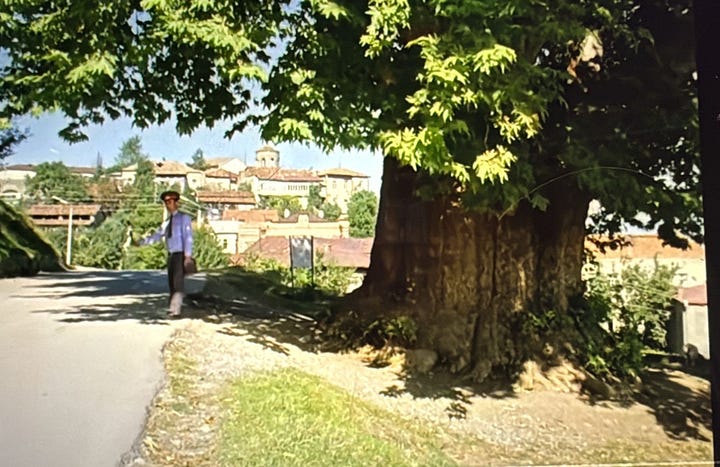An Exclusive Interview with The Ancient, Giant Plane Tree of Telavi
Guest editor Ben Arenstein nabbed this exclusive with one of Telavi's icons
Ed’s note: Responding to reader feedback that our interviews have focused solely on human subjects, we are taking your suggestions into account and are committed to expanding our interspecies discourse. Today, we’ve gone out on a limb to interview The Telavi Giant Plane Tree. In this Chat With The GPT, Guest Editor Benjamin Arenstein discusses their long life rooted in Telavi, addressing rumors spread by dendrochronologists of faked growth rings, and their upcoming memoir.
The 900-year-old tree is a 4.8-star tourist attraction near the Batonis Tsikhe fortress in Telavi, the sleepy capital of Kakheti, Georgia. In our cursory, pre-interview research during the August heat dome, we soporifically clicked on this article about “this majestic organism, the largest tree in Georgia” by the Georgian Tourism Board (GTB), which describes the tree as “a natural marvel that has borne silent witness to centuries of history.” and “dwarfs its surroundings, echoing the grandeur” and is “an enduring testament to Georgia’s rich natural heritage.”
As the Telavi Plane tree attests to being “a natural marvel that has borne silent witness to centuries of history,” then of course, our stalwart member of the Platanaceae family is likewise witnessing the Age of Artificial Intelligence. Curious if AI might have written this effusive tourist-trapping entry, we then asked our chatbot to weigh in & analyze the text for markers of such provenance. Our virtual assistant assured us the work was written by a human, noting:
The text has a few minor stylistic quirks that are more typical of human writing than the often-perfect, almost sterile grammar of AI. For instance, the use of “shouldered by the local municipality” is a slightly less common phrasing than “paid for by...” or “covered by...” This kind of subtle variation in word choice is more indicative of a human writer’s personal style. And “In short, the text exhibits a clear authorial voice and a deliberate stylistic choice that points toward a human writer. It’s an example of writing that is meant to be more than just informative; it’s designed to be evocative, a characteristic that requires a nuanced understanding of language and emotion that, until very recently, was a distinctively human trait.”
Telavi GPT possesses a human trait or two itself—evidenced by its desire to be a podcast guest! When Telavi GPT’s publicist reached out to us with an inquiry, we jumped at the opportunity. Now with the situate/contextualize out of the way, let’s get down to Ben Arenstein’s interview, conducted earlier this summer in our podcast studio, with this “symbol of Georgia’s strength and resilience”—the Telavi Giant Plane Tree.
Additional note: The Telavi GPT uses they/them pronouns, as they carry both male and female flowers, though on different stems.The interview transcript has been edited for length and clarity.


Benjamin Arenstein: I’d like to start by thanking all our listeners for tuning in to the program. We have with us today an extremely special guest. We’ve been trying to get them into the studio for years, but until now, we physically could not. It took some finagling on the part of their manager, and after a few back-and-forths, the producers finally agreed to purchase 2000 kilos of soil so that we could set up this interview. Without further ado, I’d like to introduce our guest— the Telavi Giant Plane Tree. Giant Plane Tree has had an unbelievably prolific career, producing over 100,000 leaves annually, housing thousands of bird nests, and providing shade to over a dozen square meters of earth. While most of our listeners are likely familiar with your previous work, what they may not know is that you have a memoir coming out this year, which you are here to talk about today.
GPT: That’s right, and thank you so much for having me on. I’m a long-time listener and a big fan of the show.
BA: That’s always nice to hear. So you have been alive for centuries, but I want to start our conversation by asking why you decided to write your memoir now.
GPT: Well, as you can imagine, it’s never an easy decision for a tree to write a book. It’s akin to an act of self-immolation. As you well know, paper has to come from somewhere, and too often that somewhere is trees. These could be friends, relatives, or colleagues. I actually dedicated this memoir to my great uncle, who was himself cut down for paper. Some stories, though, are too urgent not to be told. My life is one of those stories.
BA: So what in particular should our listeners know about you and your story?
GPT:The first thing they should know is that the life of a plane tree is no walk in the park. In fact, we can’t walk at all. We are just in the park. Our entire existence is watching and waiting, hoping that someone will finally see the trees for the forest. With me, that happened. As I got older, people began to take notice. Finally, I have fans who drive thousands of kilometers to visit me. TripAdvisor calls me a “must-see.”
BA: Several years ago a team of French dendrochronologists accused you of faking your growth rings by at least 100 years. Whatever came of that scandal? Were you afraid of being cancelled?
GPT: This was a devastating time for me; but I endured the humilation of core sampling to prove the haters wrong. Turns out, the droughts I suffered in the middle ages compressed the rings, which the French team misinterpreted as me manipulating my record. During this difficult time, I reached out to the Tnjri Tree (a 2,000-year old Plane Tree in Armenia) as they also have had their integrity questioned by the French. The best outcome, I can honestly say from this ordeal, is that Tnjri and became close friends and we’re actively sharing mycelium now!
BA: I hope it’s not a spoiler to say that the climax of the book is when— after finally developing a sense of yourself— you are literally split in two by a group of foresters, whose intentions remain a question mark even now. Against all odds, you survived. But how did you become truly whole again?
GPT: In my memoir, I compare this moment to the Judgement of Solomon. Neither half should have survived. You can never truly recover from a moment like that, but you can continue to move forward. The scent of the Kakhetian sunflowers wafting on a warm summer breeze, the buzzing of bees as they pollinate my neighbors, the trickle of wine from an autumn kvevri. That is what kept me going. And so long as this memoir isn’t remaindered and pulped too soon, I will be happy.
BA: Thank you so much for taking the time to speak with us today.
GPT: The pleasure is all mine.
Special thanks to our guest editor and podcast host Benjamin Arenstein! Arenstein is a dendrological dandy and PhD candidate at the university of Chicago.



